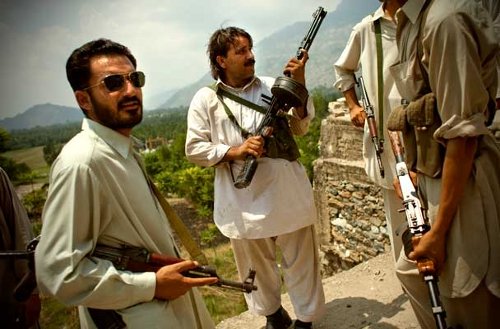
Dawn published an encouraging article noting that tribal lashkars, or local militias, are taking a stand in Swat, a region once under the full control of the Taliban until the military launched an operation last spring:
When a posse of Taliban fighters entered a mosque in this village during evening prayers last week to demand the allegiance of the congregation, long-suffering locals decided they had enough.
The villagers, of whom a majority had only just returned to their homes following the conclusion of major military operations in Swat by the Pakistan army in June, sent out word to a local Lashkar (tribal militia) who promptly arrived at the scene, shot dead three Taliban and forced the rest to flee.
One local villager was injured, and, in a sign of growing cooperation between the militia and the Pakistani army, was whisked away to a military hospital. The Pakistani military is increasingly relying upon such militias to maintain the peace and act as a first line of defence in Swat.
The first Lashkar was formed in August, and plans are now afoot to ensure every union council in the Swat valley eventually boasts its own Lashkar, according to Swat military spokesman Major Mushtaq Khan.
I have been very critical of past efforts by the Pakistani government to raise and support local lashkars. Back in November 2007 I noted that raising lashkars with little to no support would be a dangerous move, and would expose the tribal leaders to the predations of the Taliban, who are much stronger and better organized. Sadly, this came to pass in 2008 and 2009 (see a few examples here, here, and here, follow the links in the articles from more). Tribal lashkars were destroyed in Swat, Dir, Bajaur, Mohmand, Arakzai, Khyber, Buner, Peshawar, Lakki Marwat, etc., because they had no support and failed to coordinate with the military or neighboring groups.
If the Pakistani Army remains in Swat, takes the fight to neighboring districts and tribal agencies to prevent the Taliban from regrouping, facilitates communications between the lashkars, and provides real support – responding militarily when needed – the lashkars can succeed. The government and military have failed to do these things in the past; it remains to be seen if they have learned the hard lessons.
Are you a dedicated reader of FDD's Long War Journal? Has our research benefitted you or your team over the years? Support our independent reporting and analysis today by considering a one-time or monthly donation. Thanks for reading! You can make a tax-deductible donation here.







